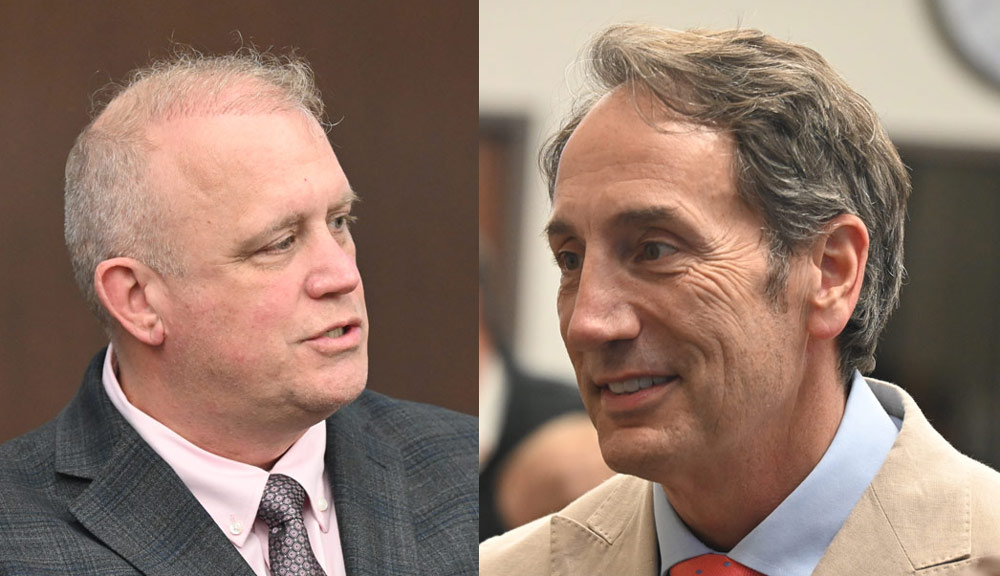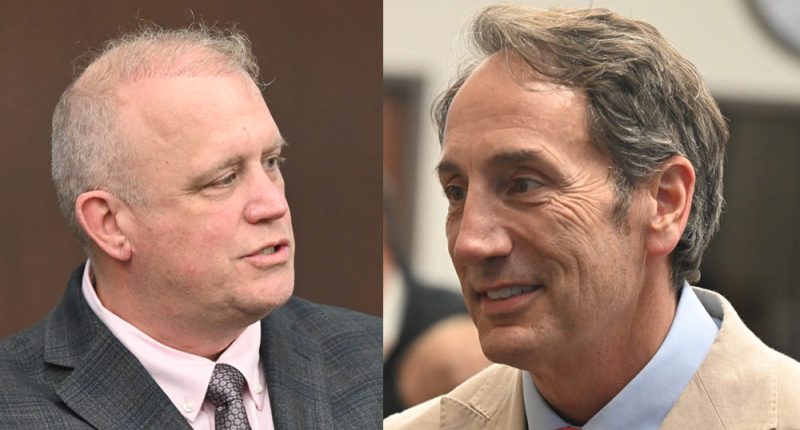
In Richard Hough and Paul Trombino, the last two candidates for Palm Coast city manager still standing at the end of a thin and self-eroded field, the City Council has two distinct choices if it decides to offer the job to one of them at its evening meeting Tuesday: one brings extensive military experience, the other brings even more extensive civil experience.
For all their differences, they have one thing in common. Neither has been a city or county manager, though both have managed large operations with large budgets and sizeable personnel.
But Trombino’s press-clip backgrounder prepared by SGR, the consulting firm that shepherded Palm Coast’s recruiting drive, is 368 pages long. Hough’s is just 44 pages. That contrast alone reflects a central difference between the two candidates: Trombino has been in the public eye, in state and local government and in the trenches of city-county-state relations far more than Hough, who’s forged his experience in the more cloaked and intractable dominions of the military.
Hough’s history of press clips is much more recent. Almost half of it is about his getting passed over for a county administrator job. The rest are about roads, traffic lights, snow removal and intersection safety. (See Hough’s clips here, and Trombino’s here. See the SGR background booklet on both here, reflecting all the documents SGR sent the council members.)
Trombino is the consummate, affable civil government geek who’s built a long and at times stellar career that culminated in the leadership of the Iowa Transportation Department and its Homeland Security Department, and drew Donald Trump to nominate him as his transportation chief in 2017–a nomination from which Trombino withdrew weeks later.
A local elected official described Trombino as “goofy” on first appearance–until the official started hearing him speak with detail and command about any matter of local and state government he is familiar with, from public works to capital improvements to emergency management to public safety to emergency responses to flooding, snow or diseases, from streets to rivers to airports. When a council member in a one-on-one interview asked about his coastal experience, Trombino said he has plenty of river experience, including the Mississippi (and the experience of a couple of Great Lakes).
Understated and unassuming, at times self-deprecating and quick with touches of wit, Trombino speaks with an easy and–from all appearances–sincere deference toward the employees he has led: he’s not interested in rebuilding an organization so much as helping it improve. He speaks in those terms about Palm Coast City Hall. In style, he is closest to Lauren Johnston, the current acting city manager, than Hough, who recalls a very different, previous city manager’s style.
“I have to earn trust every day I walk through the door,” Trombino said. “So on the city team side, you want stability, right? Trying to calm the waters a little bit I think [is] important.” He says he has no doubt about the “good people” in the organization. “I’ve done this before, coming into organizations. A lot of times, people think that they’re not empowered. They think that they shouldn’t be trying to make every day more efficient for each other. And it’s working through that process.” How? By instilling trust through transparency and honesty with the community, he says.
Hough does not come off as especially congenial so much as wilfully assertive. It’s the military in him, which likely resonates with a council stocked with four veterans. That alone may give him an inside track, as might his implicit message of command, control and confidence: He is far more Dick Kelton than Johnston, Kelton being the original Palm Coast City Manager, a blunt, sharp-edged executive brought literally to build a city government from scratch.
Four different times in his interview with the council Hough stated that he was not intimidated by one thing or another.
“That’s not an intimidation for me,” Hough said of having to answer to five council members, “because what this job is about is fusion of public staff and council communication and making that into a beacon by which you’re focusing your attentions.”
The city’s half-billion dollar budget? “I’m not intimidated by the scale of your budget,” he said. “It’s a matter of managing the priorities, and are they aligned properly inside those department Budgets.”
The turmoil of the last months, and other candidates dropping out becaus of it? “The fact that you know you have some ongoing challenges in the current environment is not something that intimidates me and somebody with my background,” Hough told the council. “I did see that you had lost some other candidates, being perhaps because of they’re a little concerned about their sustainability in that environment. If I’m fair with you and you’re fair with me, then that would be something that we can overcome, the current environment.”
City management as a whole? “I’m not intimidated by the tasks and the challenges that would come with this position, regardless of its environment, currently or in the future,” he said. “And yes, I do plan on making wherever I land probably my last community I will be in residing in, and would love to be here.”
In his one-on-one interview with Council member Theresa Pontieri, he described himself sternly as “fearless, because I know I have the skills and the analytical approaches to manage the challenging environments that have been put in the past. And if it’s here, then it’s here.” In another one-on-one, with Council member Dave Sullivan, he said: “I have held many jobs where I was an agent of change.” But he sounded a bit prickly when he blamed getting passed over for similar top jobs on candidates who “want to be the sixth politician” on a council.
Trombino has significantly more municipal, civil and executive government experience than Hough. Since June 2021 he’s been the managing director of Greeley, Colo., a city north of Denver with a population of 112,000–where Palm Coast might be in five years, if local growth continues steadily.
He was director and adviser of homeland security for the state of Iowa as well as its chief operating officer between 2019 and 2011, leading its response to the flooding crisis of 2019 in that state and coordinating its response to the Covid pandemic. He would later appear with the governor and two other government officials in a promotional video for a private company that, according to one of the reports documented by SGR, “received contracts without tender to work on the coronavirus pandemic, a move that has led to accusations of favoritism and misuse of public resources.”
He was appointed to that job in January, with a retention bonus of $46,176 on top of his mandated salary cap of $112,070. The governor’s office had written him that a 12-month period on the job was “commensurate with the amount of payment you will receive.” He left after 19 weeks, and kept almost $17,000 of the bonus, according to several media reports collected by SGR.
Trombino had built a stellar reputation as he rose through the ranks to lead various divisions of the Wisconsin Department of Transportation from 1994 to 2011, gaining substantial municipal experience along the way. “Got to touch every type of infrastructure that you could ever imagine, from ports to streets,” he said in one of his one-on-one interviews last week. “The best part about this was I got to do a lot of work in cities, in communities, Milwaukee specifically, and a bunch of other ones. And I got to see how impactful the projects could be. The best projects, as I always say, are inside the city, and I really like that.”
From there the governor of Iowa picked him to run the Department of Transportation in the state, which he did until 2016. He successfully convinced lawmakers to rais the gas tax to 10 cents a gallon during the 2015 legislative session, not an easy thing to do in a Republican state . In one of his more innovative touches that resonated with the public, he launched a “track-a-plow” system that allowed residents to track snowplows and watch their work with real-time video cameras installed on the plows.
Donald Trump in the first year of his first presidency nominated Trombino to lead the Federal Highway Administration (and nominated his boss, Terry Brandstad, to be ambassador to China). Trombino received bipartisan support to lead what was then a $44 billion agency with 3,000 employees. Weeks later he withdrew from consideration, citing family responsibilities, among them his ailing father. (Trump a few weeks ago nominated Flagler County School Board member Derek Barrs to lead the Federal Motor Carrier Safety Administration.)
Hough is a retired Army colonel who spent all but the last seven years of his career in the military, or in military-related jobs.
For a year between 2004 and 2005, he was part of the management of the rapid expansion of the military’s infrastructure in Kuwait in support of the ill-fated occupation of Iraq. He was operations officer and battalion commander in Hawaii with the 411th Engineering Battalion for the next five years, with executive oversight of nearly 1,000 personnel and an operating and training budget of $3 million, directing engineering projects and training events on four continents. (Army Reserve describes the 411th as “the Army Reserve’s most dispersed and experienced construction engineer unit in the Pacific Region.”)
Hough was a strategic planner with a focus on the Horn of Africa for a year (meaning mostly Somalia, the Red Sea and the Gulf of Aden), a brigade commander for two years, a senior research fellow at the Army Future Studies Group for eight months, from where he penned forward-looking artiles, one of which quotes Arthur Miller, another George Orwell, both reflecting his zeal for what he terms “‘succeed-fast’ and ‘fail-fast’ policies.” By which he means: “If ‘fast-fail’ policies had been applied to long-term programs the Army might have avoided the numerous failures of major acquisition programs over the last two decades.”
It’s the kind of language that’ll make some of the Palm Coast City Council members swoon. One of them –Mayor Mike Norris–at times imagines himself running the city as a barrack, often to his detriment. Another–Council member Charles Gambaro–often relies on military analogies or experience to explain his positions. Unlike Norris, his martial predilections don’t go further on the council.
Hough has since moved on to the earthier world of public works and local management, and can sound as woke as Ibram X Kendi: “How are you going out into the communities and getting a diverse opinion? That’s the other thing I’m looking for in a community. You know, I want to see diversity. I currently live in a place where 95 percent of the people are white, and that’s neither good nor bad. That’s just the way it’s been for 150 years. But you know, diversity in age and in their backgrounds, where they’re coming from, a transient population to some degree–you’ve got a lot of different voices there. How am I going to get in there? I want to go talk to families in a family setting, in a residential setting, the schools, be engaged, have our staff engaged in the schools.
He can just as easily made City Hall staffers nervous when he asked the council about “incorporating artificial intelligence into your staff, where it makes sense and where it can be safely employed,” and when he immediately followed that up with a question about “complacency” in staff.
The Palm Coast City Council meets at 6 p.m. Tuesday to discuss the city manager’s position and likely make a choice.








